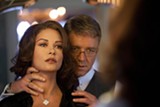[
{
"name": "500x250 Ad",
"insertPoint": "5",
"component": "15667920",
"parentWrapperClass": "",
"requiredCountToDisplay": "1"
}
]
Whatever its originality in conception and execution, "Broken City" demonstrates, in its own unusual way, the durability of film genre conventions. The movie's mixture of fictional and historical elements and its location in New York City provide a kind of verifiable background for a story of complicated schemes of manipulation and deceit, but its greatest strength derives from its fidelity to the familiar devices of its form.
The movie begins with an all-too-common event, a detective, Billy Taggart (Mark Wahlberg) shooting a suspect on a dark night, in an ambiguous situation that lands him on trial for murder. Although exonerated and praised by the mayor, Nicholas Hostetler (Russell Crowe), Taggart is dismissed from the force. When the picture reopens seven years later, he is working as a private detective in Brooklyn, barely scraping by as a peeper, a seedy voyeur snapping photos of straying spouses.
Just before the end of his re-election campaign in a close race against Councilman Jack Valliant (Barry Pepper), the mayor summons Billy and offers him $50,000 to spy on his wife, Cathleeen (Catherine Zeta-Jones), to find out if she's betraying him. Billy tails her and photographs her meetings with Valliant's campaign manager (Kyle Chandler). When he hands the pictures to Hostetler, a couple of people warn him off, and Billy begins to realize that much more lies beneath the surface of an adulterous affair, including political corruption and graft in the billions of dollars.
Although the script never fully clarifies the financial complications, it maintains a powerful fidelity to its title. All the characters in that broken city apparently practice the dark arts of duplicity and deception in both the personal and political realms, and for the most part Billy serves as their major patsy and victim. The mayor, his wife, the police commissioner (Jeffrey Wright), even Billy's long-time girlfriend (Natalie Martinez) all betray him in one way or another.
The movie demonstrates some correspondence to contemporary history in its actions and people. Russell Crowe's smug confidence and arrogant manner echo something of the personality of Mayor Ed Koch, while Barry Pepper, the rich, handsome Ivy Leaguer, resembles the late John Lindsay in both appearance and background. Even the gigantic housing deal that will evict lower-income residents to profit a developer and the mayor sounds like a classic Donald Trump stratagem.
Beyond their connections to real life counterparts, the actors all make their characters as plausible as the situation that motivates them. Though he's played a number of "good" characters in the past, Russell Crowe shows he can portray a clever, oily bad guy, and Catherine Zeta-Jones, who appears all too sparsely, demonstrates promise as a femme fatale right out of film noir. As in some previous films, Mark Wahlberg suggests that he may be a legitimate heir to the legacy of John Garfield as a tough, decent, working-class guy victimized by a decadent socio-economic class.
Despite its references to recent history, the elegance of most of its interiors, and the fine exterior shots of New York City, the picture really depends upon a field of reference out of the rich past of Hollywood and 20th century fiction. "Broken City" repeats or updates many of the established devices of the American hard-boiled detective novel and the scores of movies the form spawned.
In the great tradition, Billy Taggart's low-rent office contrasts with the mayor's palatial digs, as his own life differs drastically from the posh elegance of his clients and the people he investigates. His hardworking secretary (Alona Tal) trades wisecracks with him in the manner of numerous loyal, devoted, tough-talking female sidekicks in American detective fiction and film. He experiences the same uneasy relationship with the police and even suffers the same sorts of beatings and brutality of his predecessors in the novels of Dashiell Hammett and Raymond Chandler.
Mark Wahlberg may not exactly rise to the level of Humphrey Bogart, but he occupies some of the same territory, repeats some of the same behaviors, and comprehends some of the same sense of moral ambiguity that governs his world. In "Broken City" he comes to understand the truth of Sam Spade's wised-up and unillusioned remark in "The Maltese Falcon": "Everybody's got something to conceal."
Latest in Movie Reviews
More by George Grella
-

Film Review: "Cake"
Jan 26, 2015 -

Film Review: "American Sniper"
Jan 19, 2015 -

Film Review: "Inherent Vice"
Jan 12, 2015 - More »






